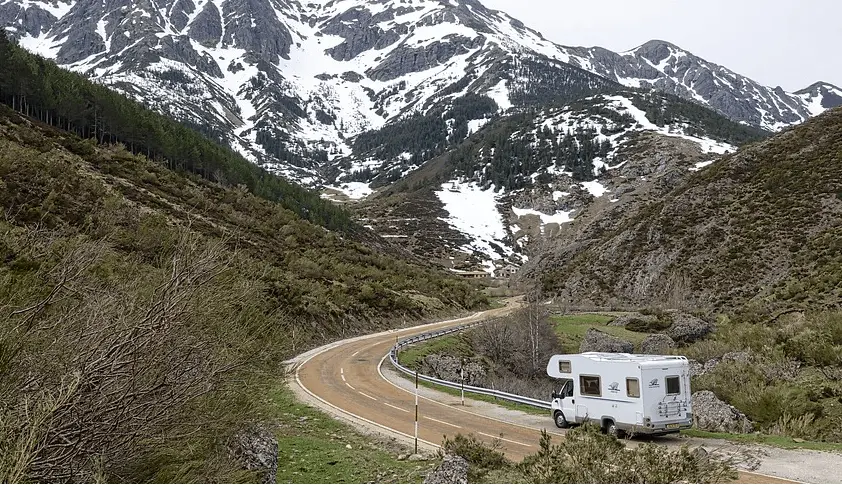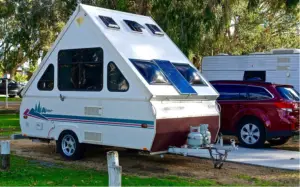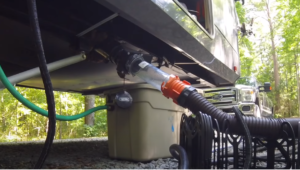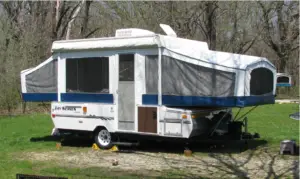A RV or camper is a bulky vehicle and thus the mileage or mpg (miles per gallon) that you get with them is less. Many people around the united states live full time in RV and the costs with RV’s aren’t that high when you compare with hotels.
But, with increasing gas and diesel prices, the gas mileage does mean a lot and getting a good mpg for your motorhome means you are saving good amount.
A motorhome on an average gives mpg of around 8 – 20 miles per gallons. Having said this, it depends on the type of RV you have, the weight of the RV and many other factors like driving conditions, the age of the RV and so on.
We will see all these mpg affecting aspects in detail. So, get ready to know why exactly your motorhome isn’t giving that many miles and what can you do to increase the overall miles per gallon.
Okay, that was about motorhomes, what about towable RV’s like fifth wheel and travel trailers. On an average a car towing a RV will get an mpg between 14 to 25 miles per gallon. Not all cars or trucks have similar mpg, in terms of percentage you should see a drop of around 15-30% in the original mpg of the towing car or truck. This again will depend on many factors but on an average it will remain withing this range.
Knowing the approximate mpg for your motorhome type kind of helps you know if you are doing fine or not. Its important to plan when you are full time living and expecting out of proportion results will only make you sad. Also, if you think a motorhome will make you spend a lot on fuel all the time, then you are wrong.
Yes, the mpg is mostly low but overall costs aren’t that high (if you compare per week costs with hotels). And, that’s the reason more and more people are towards saving the money and finally going into full time RVing. Okay, enough of comparison, lets deep dive into the mpg details of specific type of RV’s and ways to improve the overall mpg.
Average miles per gallon for a class A motorhome
A class A motorhome is no doubt the heaviest of them all. They weigh lot, more than a class B RV or a smaller trailer. The weight can be as high as 35,000 lbs. Now, that’s too much weight and imagine what will be the miles that you will get.
On an average a class A motorhome gets around 8-12 mpg. That’s less, but with that kind of weight its completely normal. You cant expect it to give you mileage like a car. Remember, the heavier the vehicle lesser is the mileage that you get.
Class A RV’s include a ton of amenities and that’s the reason they are so heavy. Monster class A rv can be intimidating for new drivers, handling also is little difficult. But, with experience that can be mastered. So, with this kind of mileage do you really feel its worth-it to own a class A?
Well, they are luxury on road and the owners can definitely afford the mpg. When you are paying more than hundred thousands for a motorhome it better be good irrespective of mpg. And class A are really the thing you want to own (if you have the money). They have amenities packed in that will put a luxury hotel to a shame.
With such a mpg you also need a gas tank that be so big that you can travel to distances you desire easily without refiling again and again. They do have big tanks mind you. We will see the tank details in below section.
mpg in case of class C motorhomes
Class C motorhomes too are heavy and weigh around 20,000 lbs. They are mostly built on truck chassis and even with the type of construction they can be luxurious (if not as luxurious as class A). You do get lot of amenities with them and also provide for sufficient safety.
You also get class C plus type with better floor plans and more slide outs. Most class C RV’s are enough large to accommodate 6-8 people inside them. Now lets jump to the mileage details.
On an average with class C motorhome you can expect a 10-14 miles per gallons. Class C RV’s are little shorter than class A motorhomes and pack in almost everything that you need for a comfortable camping.
You do get smaller class C rv’s but mostly the mileage would remain in the range specified above. The main reason why the mileage remains in this range is the weight. Also, if the motorhome tows things like a boat or a car then again the weight would increase and the mileage reduce.
Class C motorhome are little bit compact than the full style class A motorhomes and thus tend to be little less in weigh. And thus, average mileage going a little bit up. Weight however is not always really proportional to mpg though.
Definitely some of you out there will say we get much lesser mpg than what you have mentioned. Yes, that’s possible. The mileage not only depends on weight but also on other facts, which we will see after we cover all the RV types below.
Mileage of a class B motorhome
Class B motorhomes are specially built RV’s and are different then conversion vans. They are however smaller in size and weigh much lesser than other motorhomes.
While basic class B motorhomes may not have many things but a high end version may be equipped with good appliances. They can weigh anything between 10,000 lbs to 20,000 lbs. Lets have a look at the mpg.
On an average a class B motorhome gives around 16-20 mpg. That’s much better if you compare with other luxurious types like class A or class C. But, yes they are smaller and will not be any kind of match when it comes to amenities, appliances and space.
Most of the times, the manufacturer will list the mpg as higher in case of class B but its only when you fully load the motorhomes, get the tanks full and drive to test the real mpg. It also depends on the age of the motorhome, an old class B RV may not give you good mpg as compared to the one that just came out from the dealer. There is another factor that we will discuss, the maintenance.
A old RV lags in mileage because it may not have been well maintained. Remember , Rv’s are the vehicle types that need better maintenance and with proper schedule else be ready to face the issue and visits to repair shop.
Is car mpg affected with towing travel trailer
There is no doubt that pulling a travel trailer behind the car will reduce the actual mileage of the car. This is general rule that more the weight less will be the mileage in cars. That is the weight is inversely proportional to the mileage that you get. A car,SUV or a mini truck is designed to carry certain load and the mpg is mentioned for that weight. And with the increased weight the mileage will automatically come down.
A car giving a mileage of around 25-30 gallons normally could be reduced to 14-22 mpg depending on the weight being towed. Having said this, it depends on the hitch being used, driving conditions and the car capacity.
Thus, a trailer towing not only put the driver into special driving conditions but also puts pressure on the overall mileage. Another factor with towing is that the mileage may be little higher when you go on driving stretch that are long enough. If you make halts again and again than that definitely reduces the mileage to some extent further.
A trailer can be of different lengths and thus different weights. So, the mileage reduction will depend on the size of the trailer you are towing. A smaller trailer may not impact the mileage but as you go with bigger trailer the mileage will reduce. Its the same thing, the bigger the RV lesser is the overall mileage.
Fifth wheel miles per gallon
Just like travel trailers, the fifth wheel also need to be towed behind truck. Only difference is that the fifth wheel will have a part hanging above the truck bed in the end. Fifth wheel unlike travel trailer offer little more luxury and are also bigger. They tend to have lengths that are similar to class A rv.
Fifth wheel have good amenities but they are also costly. In-fact much costlier than a normal travel trailer. A fifth wheel on an average weighs around 16000 lbs to 22,000 lbs.
With this kind of weights again the truck or car mpg can reduce to below 18 or so depending on the weight of the fifth wheel and other conditions as usual. A fifth wheel wont do better as compared to trailer as it weighs a little higher.
A fifth wheel also needs special arrangement for towing vehicle. The end bed of the car or truck need to be supporting the towing connection unlike trailers where the hitch is after the car end. Fifth wheel are classy and look so stylish, i love them. But, when it comes to miles per gallon of the car, it is same as a travel trailer.
Towing pop up camper or tent trailer – mpg
Pop up campers are the modest forms of trailers. They hardly weigh anything. On an average the tent trailers or pop up campers weigh around 800 to 2000 lbs. I had covered the details of pop up camper weight in this article (do have a look to know more about pop up camper weight and other details). That’s nothing when you compare to a fifth wheel or a bigger travel trailer.
Remember the weight of the towing trailer is inversely proportional to the mpg and thus with pop up campers the mpg of the car reduces but not that much.
Towing a pop up camper wont reduce the car gas mileage more than 5-10 or so and thus it wont put much pressure on your car. The weight, price and size of the pop up camper is a major factor for choosing it.
With pop up camper the driving is also not difficult as compared to bigger RV like travel trailer or fifth wheel. Bigger the RV, difficult is the handling of it.
How does the mpg varies , factors that affect mpg for RV’s
Now that we have covered almost all forms of RV for their miles per gallons, lets list out all the factors that decide or affect the mileage. There are many factors that directly or indirectly impact the mpg.
1. Weight of the RV
We already saw how bigger RV’s have reduced mpg and how the smaller the RV better is the mileage. Weight of a RV can be a real problem not only for miles per gallons but also for handling. Weight of the RV can be due to many factors or elements. Remember the RV weight is not only due to its construction but because of the items that are placed inside.
A RV having a bigger refrigerator, bigger kitchen area with dinette and lots of other appliances will be heavier. Where as a RV that has only basic items inside will be less in weight, that’s the reason a pop up camper weighs much less.
Its also dependent on the gas, water that you carry. Water can be a big weighing factor and not many people realize it. It weighs around 8 lbs per gallon. And thus, when you have a 100 gallons of fresh water, imagine what will be the weight. And on top of that you also have holding tanks. All in all the weight can increase like anything with camping items coming inside.
2. RV condition
A RV is probably the vehicle that needs maintenance the most. Its big vehicle with a usage that needs more care. A scheduled maintenance is a better approach for keeping the health of its engine. An RV insurance covers for its maintenance but you need to have a proper one that covers all aspects of maintenance.
RV mpg is much dependent on how the RV is doing. An old RV that has been neglected without any proper maintenance will be hampered in terms of the mpg. Thus, if you have been not doing that proper maintenance of the RV, then do not expect it to give you high mpg even if its a smaller one. Another factor is the tire pressure of the motorhome.
Maintaining correct tire pressure is very important and having less pressure may reduce the overall gas mileage of the motorhome. Regular maintenance will include lots of procedures which the RV professional or repairer will be able to take care.
Changing oil timely, and perhaps using that correct motorhome is another point to keep in mind. Not following these factors will definitely reduce the mpg by 10-15%. These points look small but ultimately the mpg takes the toll.
3. Way of Driving
They say a vehicles mileage is much more dependent on the way the driver drives the vehicle. Same is true for your RV as well. Now, what does that mean? Driving the RV with constant speed, not driving the RV too fast or too slow could be some of the point to remember.
So, what speed is best for driving. The most economical speed is found to be around 55 miles per hour. Driving the motorhome at this speed can be good and give you better mpg.
Many people find this to be true and driving at speeds like 70 or 75 mile per hour can reduce the mpg to an extent of 5% or more.
4. Driving road conditions
No matter how good your motohrome is, it will all come down to the road on which you are driving. If you happen to be living or driving through road conditions that aren’t well then the mileage will get a hit.
Similarly, if the road is mostly a freeway then you get to drive at constant economical speed and the result ill be better mpg. If you like going camping at areas that need to go through muddy roads and or lots of turn and curves then it may need taking more stops. And that may cause the mpg come down.
Most of the times you will find roads to be good but this factor will always be there to some extent and will lead to atleast plus or minus 5% mileage difference.
When you are driving the rv as a newbie it needs special attention, do have a look at some important tips for driving the mototrhome.
5. Age of the motorhome
Motorhome do have high life and can be used for years. Even though the usability will be there but still the mileage may not be as good as it may have given you earlier. Want to know how the age of travel trailers vary, then have a look at the article in link above that i posted earlier.
No matter how much maintenance you do, the overall engine will definitely get a hit with time. And the result will be reduced mpg. The best you can do is regularly do RV checkup and take all the precautions as far as possible. One of the reasons why people do not want to buy a used RV is this, the reduced mpg in them.
The older the RV, lesser will be the mileage. This may not apply to all motorhomes though. You will find RV owners saying they get good 16 mpg even with 15 year old RV.
Tips to get better mpg in RV’s or campers
So, you have bought that used motorhome and you had no idea what mileage it would give you. And, now you are looking for tips to see if you can increase the overall mileage. Or chances are that you had bought a brand new RV, and from past few months or so the mpg has reduced.
In any of the cases, chances are that some of the factors i listed above could be the root cause. So, lets put all these point as summary that you can do, to increase the mpg of the motorhome or trailer.
1] Reduce weight on the RV.
Yes, the RV weight in itself cannot be reduced but at-least you could make sure extra weight is not put on the RV. Carry items that are absolutely needed and keep unnecessary ones out. Planning is key when packing for the camping trip. Having a good checklist and following exactly as per that can help a lot.
2] Regular and scheduled maintenance.
Make sure you take good care of the RV and take regular appointment with RV specialist to make repairs and maintain the engine in good health. Changing oil from time to time, using recommended oil are some of things to be followed.
3] Maintain correct Tire pressure
Make sure the motorhome tires or trailer tires are properly inflated. Keeping correct pressure will maintain good mpg. Another point is using old tires with thread completely worn out. Tires have limited life and make sure you replace them timely. Else, there are chances of blow out as well.
4] Drive at economically speed
Driving at a speed of around 55 miles per hour is considered most economically and make sure you don’t drive at speed which is much higher. Maintaining a constant speed is another factor, and hence you wills see good gas mileage on long stretch of straight roads without turns and stops. Using Cruz control can also help, but here again make sure the speed is 55 or max 60 miles per hour.
5] Buy RV or motorhome that are light in weight
Yes, the weight of the RV cannot be reduced, but if you are planning to buy a new one, than make sure that the initial weight itself is less. You may have to sacrifice a little bit on amenities but its upto you. Make a purchase that will be good for fuel. That makes sense if you are planning to go full time or you are into camping that’s more number of days per week.
Do diesel motorhomes get better mpg
Diesel motorhomes normally give better fuel efficiency and you may get few mpg more than gasoline. This however may not be true in all cases, few people do not agree on this. Diesel motorhomes in general are better capable of carrying capacity and also diesel is normally lesser in price as compared to gasoline and thus you can make savings.
Braking is also better in case of diesel engines and means better control over those huge bulky motorhomes. Diesel engine are better or not is a completely different topic though. There are many factors which can be against each of them. lets not get into that in this article.
Motorhome gas tanks sizes
A motorhome can have a gas tank that could be ranging from 25 gallons to 150 gallons. Most motorhomes will have tanks that are in the 60-80 range though. This also depends on the type of RV. Class A RV will have bigger tanks as compared to class C and class B.
On an average a class A Rv will have a gas tank of around 80-150 gallons. A class C will have a gas tanks of around 40 to 80 gallons where as the class B will have the least tank sizes of around 25 to 40 gallons.
Such big tanks, imagine the time it will take to fill them fully. A class A Rv with tank of around 100 gallons can take around 6-8 minutes to fill fully (you could eat a McDonald burger in that time, or take a nap to relax LOL)
So, how many miles you could go with a full tank. A Class A rv say 100 gallons tank can go around 800 to 900 miles. Where as class C of around 80 gallons can go upto 1000 to 11000 miles.
A class B with a 30 gallons tank can take you upto 500 o 600 miles. Great! isn’t it. But, these are ideal numbers and do not expect it to take you that long you if do not have ideal driving conditions and other factors.
How much will it cost to fill the tank fully?
With approximate current rates class A RV will need you to spend at-least 350 to 400 USD, class C around $250 to $350 and class B around $120 to $150 USD
So, whats the best mpg for a motorhome then?
After going through all the points and discussion i am sure you know what the answer is. Its subjective. Depends on lots of points, some of them in your control and some not in your control.
After trying all things if you get a mpg of more than 12 or 14 miles per gallon then you should be fine and happy to some extent. And, you can always try hard to make it better.
Knowing your current gas mileage itself can help you a lot. You can analyse and make it better by trying different elements and taking measures that are good for your RV.





